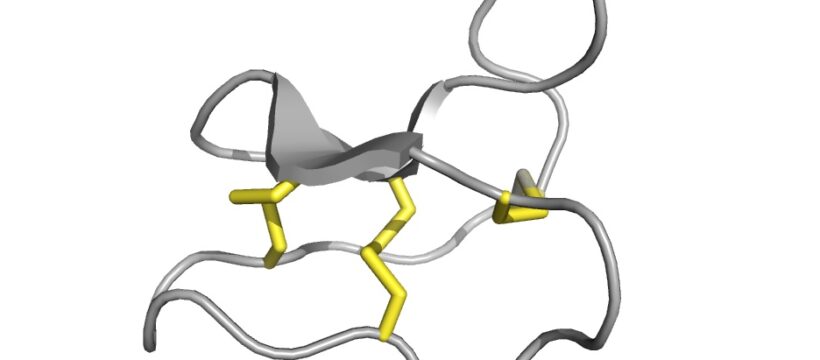Plant-derived ring peptide and its variants show anti-tumor activity against lymphoma cells. Oncological study with participation of KL Krems.
Krems (Austria), 13. September 2022 – An Austrian study demonstrates an anti-tumor effect of certain nature-derived cyclic peptides. The study, which has now been published internationally, not only demonstrates the inhibition of cell division by these peptides, but even their ability to cause cell death of cancer cells. Until now, one focus under investigation was the immunosuppressive effects of these peptides. An effect that also makes them promising candidates for a multiple sclerosis drug. The anti-tumor effects now discovered in certain lymphoid cancer cells add an important new facet to the spectrum of action of these unusual peptides.
Cyclotides are small, ring-shaped peptides originally discovered in African plants in the 1960s. Later in the 2010s, one of them (kalata B1) was recognized to have an immunosuppressive effect. This involves inhibiting the cell division of immune-active cells (T cells), which could enable the treatment of autoimmune diseases. A team from three Austrian universities and a research institute in Vienna thought beyond this and speculated that this cell division-inhibiting effect could also help with cancers that rely on the proliferation of T cells. Their now-published results of an extensive study indeed demonstrate an anti-tumor effect on certain lymphoid cancer cells.
Culture & Model
„In fact, we were able to demonstrate this effect in two different test systems,“ explains Prof. Dagmar Stoiber-Sakaguchi, head of the Division Pharmacology at the Karl Landsteiner University of Health Sciences (KL Krems). „Both in cell cultures and in animal models, the anti-tumor effect was clearly shown.” And first author Dr. Judith Lind, a research associate in the Molecular Oncology/Hematology group, adds: „We therefore see these particular cyclotides as promising candidates for drug development against anaplastic large cell lymphoma (ALCL), the type of lymphoma we are studying.“
A synthetic form of kalata B1, known as T20K, and variants of it that differ in a few amino acids served as the basis for the study. „In a first step, we looked at the effect of increasing concentrations of the different T20K variants on cell cultures of ALCL,“ elaborates Dr. Karoline Kollmann of the Institute of Pharmacology and Toxicology at the University of Veterinary Medicine Vienna. „This showed that the peptides could both inhibit cell growth and induce cell death of the cancer cells. And this in a clear concentration-dependent manner.“ Moreover, further studies showed that T20K stimulated important cell-internal signaling pathways based on the proteins STAT5 and p53.
Cancer Cell Death
Further pivotal studies were then performed in mouse models of ALCL. Here, the findings from the cell cultures were impressively confirmed, as Assoc. Prof. Christian Gruber from the Institute of Pharmacology at the Medical University of Vienna points out: „Our data show that T20K induced apoptosis – i.e. cell death – of cancer cells, and that the tumors in treated animals were about half the size, as compared to untreated controls.“
With this study, which has now been published internationally, the collaboration of the three universities with the former Ludwig Boltzmann Institute for Cancer Research lays a solid foundation for further research into T20K for the treatment of ALCL. Furthermore, with this study, KL Krems also emphasizes its commitment to basic oncology research, which strengthens its numerous clinical activities in the field of oncology.
Original publication: The nature inspired peptide [T20K]-kalata B1 induces anti-tumor effects in anaplastic large cell lymphoma. J. Lind, R. Hellinger, P. Kudweis, H. P. Moll, J. Gattringer, K. Thell, S. Edtmayer, C. W. Gruber, D. Stoiber, K. Kollmann, Biomedicine & Pharmacotherapy, 153 (2022), 113486, https://doi.org/10.1016/j.biopha.2022.113486
About Karl Landsteiner University of Health Sciences (2022)
At Karl Landsteiner University of Health Sciences (KL) in Krems, the comprehensive approach to health and disease is a fundamental objective for research and teaching. With its Europe-wide recognized bachelor-master system, KL is a flexible educational institution that is tailored to the needs of students, the requirements of the labor market as well as the scientific challenges. Currently KL hosts about 600 students in the fields of medicine and psychology. The three university hospitals in Krems, St. Poelten and Tulln ensure clinical teaching and research at the highest quality level. In research, KL focuses on interdisciplinary fields with high relevance to health policy – including medical technology, molecular oncology, mental health and neuroscience, as well as water quality and related health aspects. KL was founded in 2013 and accredited by the Austrian Agency for Quality Assurance and Accreditation (AQ Austria). www.kl.ac.at/en
Scientific Contact
Prof. Dr. Dagmar Stoiber-Sakaguchi
Division of Pharmacology
Karl Landsteiner University of Health Sciences
Dr.-Karl-Dorrek-Straße 30
3500 Krems / Austria
T +43 2732 72090 470
E dagmar.stoiber@kl.ac.at
W http://www.kl.ac.at
Karl Landsteiner University of Health Sciences
Eva-Maria Gruber
Communications, PR & Marketing
Dr.-Karl-Dorrek-Straße 30
3500 Krems / Austria
T: +43 2732/720 90 – 231
M: +43 664 5056211
E: evamaria.gruber@kl.ac.at
W http://www.kl.ac.at/
Copy Editing & Distribution
PR&D – Public Relations for Research & Education
Dr. Barbara Bauder
Kollersteig 68
3400 Klosterneuburg / Austria
T +43 664 1576350
E bauder@prd.at

